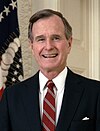Portal:Conservatism
| Main page | Showcase | Project |
Introduction
Conservatism is a cultural, social, and political philosophy and ideology that seeks to promote and preserve traditional institutions, customs, and values. The central tenets of conservatism may vary in relation to the culture and civilisation in which it appears. In Western culture, depending on the particular nation, conservatives seek to promote and preserve a range of institutions, such as the nuclear family, organised religion, the military, the nation-state, property rights, rule of law, aristocracy, and monarchy. Conservatives tend to favour institutions and practices that enhance social order and historical continuity.
Edmund Burke, an 18th-century Anglo-Irish statesman who opposed the French Revolution but supported the American Revolution, is credited as one of the forefathers of conservative thought in the 1790s along with Savoyard statesman Joseph de Maistre. The first established use of the term in a political context originated in 1818 with François-René de Chateaubriand during the period of Bourbon Restoration that sought to roll back the policies of the French Revolution and establish social order.
Conservatism has varied considerably as it has adapted itself to existing traditions and national cultures. Thus, conservatives from different parts of the world, each upholding their respective traditions, may disagree on a wide range of issues. One of the three major ideologies along with liberalism and socialism, conservatism is the dominant ideology in many nations across the world, including Hungary, India, Iran, Israel, Japan, Poland, Russia, Singapore, and South Korea. Historically associated with right-wing politics, the term has been used to describe a wide range of views. Conservatism may be either libertarian or authoritarian, populist or elitist, progressive or reactionary, moderate or extreme. (Full article...)
Selected article
In the 1988 presidential election, Bush launched a successful campaign to succeed Ronald Reagan as president, defeating Democratic Party nominee Michael Dukakis. Bush's presidency was driven by foreign policy during a time of world change as military operations were conducted in Panama and the Persian Gulf. Additionally, the Berlin Wall fell in 1989 and the Soviet Union dissolved two years later. In the wake of economic concerns, he lost the 1992 presidential election to Democrat Bill Clinton.
Selected quote
This outrage on all the rights of property was at first covered with what, on the system of their conduct, was the most astonishing of all pretexts-a regard to national faith. The enemies to property at first pretended a most tender, delicate, and scrupulous anxiety for keeping the king's engagements with the public creditor. These professors of the right of men are to busy in teaching others, that they not leisure to learn any thing themselves; otherwise they would have known that it is to the property of the citizen, and not to the demands of the creditor of the state, that the first and original faith of civil society is pledged. The claim of the citizen is prior in time, paramount in title, superior in equity. The fortunes of individuals, whether possessed by acquisition, or by descent, or in virtue of participation in the goods of some community, were no part of the creditor's security, expressed, or implied. They never so much as entered into his head when he made his bargain. He well knew that the public, whether represented by a monarch, or by a senate, can pledge nothing but the public estate; and it can have no public estate, expect in what it derives from a just and proportioned imposition upon the citizens at large. This was engaged, and nothing else could be engaged to the public creditor. No man can mortgage his injustice as a pawn for his fidelity.
— Edmund Burke, Reflections on the Revolution in France (1790)
Selected image
Latin Conservatism is a political ideology in southern Europe that was founded by noted Savoyard thinker Joseph de Maistre and which reached its peak in Spain under Francisco Franco. In contrast to Burkean Conservatism, which originated at about the same time, Latin Conservatism is uncompromising in its belief in the need for order. While Burke supported constitutionalism and some degree of democracy, Maistre, like Thomas Hobbes before him, though with a more religious tone, supported authoritarianism as the only means of avoiding violent disorder. Maistre, a diplomat who had to flee for his life during the French Revolution, became convinced that ultra-liberal ideas, particularly Rousseau's theory of a "general will", had led to the horrors of the French Revolution and the bloodshed of the Napoleonic Wars. In forceful terms he compared the situation of his day to the Book of Genesis.
Credit: Kjetilr
Did you know...
- ...that Ronald Reagan's autobiography, An American Life, reached number eight on The New York Times' bestsellers list?
- ...that the Minute Women of the U.S.A. was a militantly anti-communist organization for American housewives in the 1950s?
- ... that Norwegian botanist and politician Olaf Alfred Hoffstad taught at Sandefjord Upper Secondary School for almost 43 years?
Selected anniversaries in September
- 1854 – the United States Republican Party is founded. The party opposed the expansion of slavery, called for free homesteads to farmers ("free soil"), and sought to modernize banking, railroads, and industry.
- 1871 – the Brazilian Parliament passes the Law of Free Birth, a measure championed by Rio Branco
- 1994 – the Contract with America is signed by Republican Party members on the steps of the United States Capitol.
Topics
Associated Wikimedia
The following Wikimedia Foundation sister projects provide more on this subject:
-
Commons
Free media repository -
Wikibooks
Free textbooks and manuals -
Wikidata
Free knowledge base -
Wikinews
Free-content news -
Wikiquote
Collection of quotations -
Wikisource
Free-content library -
Wikiversity
Free learning tools -
Wiktionary
Dictionary and thesaurus










